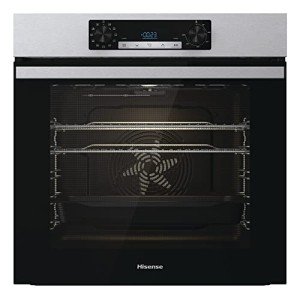Ten Single Fan Ovens That Really Improve Your Life
페이지 정보

본문

Understanding Single Fan Ovens: A Comprehensive Guide
Introduction
As modern-day kitchen areas grow significantly sophisticated, appliances designed for efficiency and performance are at the leading edge of customer interest. One such appliance that remains popular among home cooks and baking lovers is the single fan oven, an electric design understood for its flexibility and ease of use. This article supplies in-depth info about single fan ovens, including their functionality, advantages, types, and considerations for purchase.
What is a Single Fan Oven?
A single fan oven, also called a stove, includes a single cooking chamber with a fan and exhaust system that flows hot air consistently throughout the cooking area. This results in an even cooking temperature level and improved cooking performance compared to traditional fixed ovens.
Secret Components of a Single Fan Oven
- Heating Elements: Usually located on top and bottom, these generate heat for cooking.
- Fan: The central feature that distributes the hot air within the oven, promoting quicker and more even cooking.
- Thermostat: Regulates the temperature to ensure ideal cooking conditions.
- Control Panel: Provides interface options for setting temperature levels, cooking times, and modes.
How Does a Single Fan Oven Work?
Single fan ovens run by combining the heat from the heating elements with the air motion created by the fan. The hot air is dispersed equally around the food, considerably minimizing cooking time while also permitting lower cooking temperatures.
Advantages of Using a Single Fan Oven
- Faster Cooking Times: The distributing air enables food to cook faster compared to standard ovens.
- Even Cooking: Food is exposed to constant heat from all sides, decreasing the possibilities of unequal cooking or hot areas.
- Flexibility: These ovens can be utilized for baking, roasting, and even grilling, making them appropriate for a vast array of dishes.
- Energy Efficiency: By cooking at lower temperatures and in less time, these ovens may use less energy than their conventional equivalents.
- Wetness Retention: The style assists keep wetness in dishes, resulting in juicy roasts and baked products with a light texture.
Kinds Of Single Fan Ovens
When considering a single fan oven, consumers might experience different types based upon functions and style. Here are a few typical types:
1. Built-in Single Fan Ovens
- Description: Integrated into kitchen cabinetry for a seamless look.
- Pros: Saves counter area, aesthetically pleasing.
- Cons: Higher setup expenses, might need expert help.
2. Freestanding Single Fan Ovens
- Description: Standalone systems that can be put throughout the kitchen.
- Pros: Easy to set up, versatile positioning.
- Cons: Can take up more space, might not mix well with cabinetry.
3. Range Cookers with Fan Ovens
- Description: Multiple cooking alternatives, including a fan oven, combined in one system.
- Pros: Offers different cooking techniques, perfect for ambitious cooks.
- Cons: Generally more expensive, bigger footprint.
Contrast Table of Single Fan Oven Types
| Type | Pros | Cons |
|---|---|---|
| Built-in | Space-saving, aesthetically pleasing | Greater expenses, expert setup needed |
| Freestanding | Versatile positioning | Uses up more area, might not match kitchen cabinetry |
| Range Cooker | Several cooking approaches | Greater price, bigger size |
Selecting the Right Single Fan Oven
When deciding on a single fan oven, a number of elements must be thought about to make sure that it satisfies personal cooking requirements and fits within your kitchen layout.
Factors to Consider
- Size and Capacity: The size needs to complement your kitchen design while providing sufficient capacity for your cooking practices.
- Features and Functions: Look for adjustable racks, self-cleaning options, and several cooking modes to improve versatility.
- Energy Efficiency: Check for energy rankings; some designs are created to be especially energy-efficient.
- Budget plan: Costs can differ substantially, making it crucial to develop a practical budget ahead of time.
Maintenance Tips for Single Fan Ovens
- Regular Cleaning: Wipe down interior surfaces after usage to prevent residue accumulation.
- Inspect the Fan: Ensure the fan is free from obstructions and working correctly.
- Inspect Seals: Regularly check the door seals for wear and tear to preserve cooking effectiveness.
- Expert Servicing: Schedule routine professional checks to guarantee optimal operation.
Frequently Asked Questions about Single Fan Ovens
1. Can I utilize my single fan oven for baking?
Definitely! Single fan ovens are exceptional for baking, offering consistent temperature levels vital for cakes, cookies, and breads.
2. Is it required to preheat a single fan oven?
While preheating is typically recommended for optimal results, due to the efficiency of a fan oven, some dishes might not need it.
3. Can I cook numerous dishes at the same time?
Yes! The even heat distribution in single fan ovens allows you to bake or roast multiple dishes simultaneously, making use of all rack levels efficiently.
4. Does a single fan oven cook faster than a traditional oven?
Yes, the fan-assisted heating decreases cooking times, making it possible for quicker food preparation.

Single fan ovens offer a remarkable balance of speed, adaptability, and effectiveness, making them an important addition to any kitchen. Whether for baking, roasting, or daily cooking, these ovens ensure that home cooks can produce scrumptious meals with ease. By understanding the benefits, types, and factors to consider for buying a single fan oven, customers can make an educated choice that lines up with their culinary desires and kitchen characteristics.
Embracing the performances of a single fan oven certainly leads the way for improved cooking experiences in the modern-day kitchen.
- 이전글In 15 Minutes, I'll Give You The Truth About Free Poker 25.07.02
- 다음글"사라진 커피 컵의 미스터리" 25.07.02
댓글목록
등록된 댓글이 없습니다.
